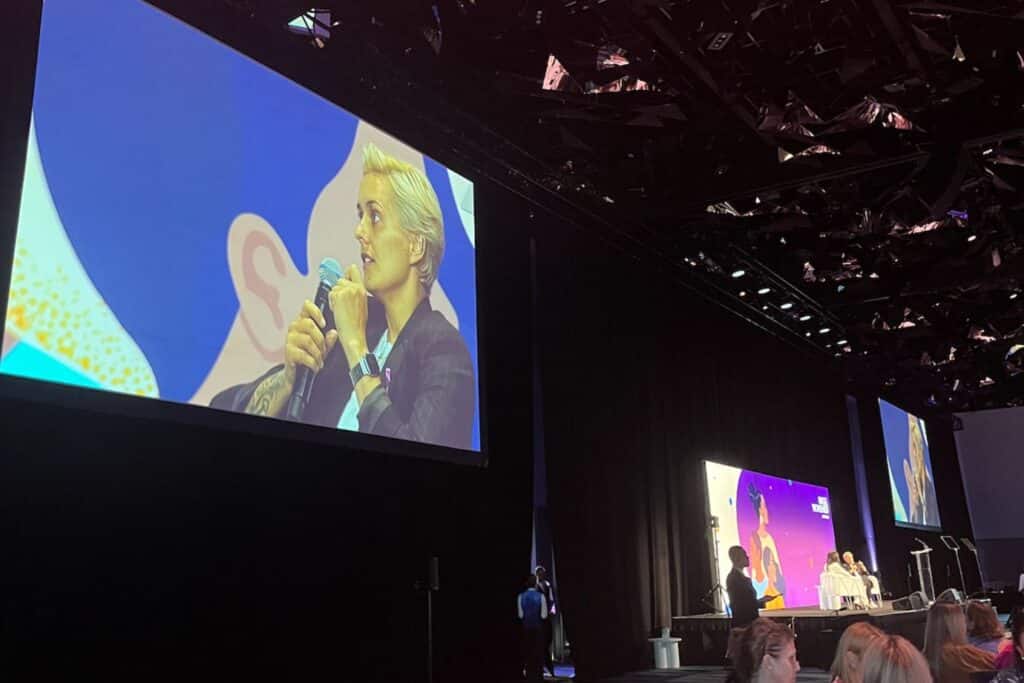Moana Hope has never worked for a woman in her life. Throughout her time in AFLW and early career in traffic management, she has always answered to a man.
But there is one woman in her life that has always been a true role model for her: it’s her mother.
“She gave every little thing she had to us,” Hope said.
“Everything I do, I do for her.”
Hundreds of people gathered at the International Convention Centre (ICC) in Sydney’s Darling Harbour to listen to Hope and other speakers at the UN Women’s 2024 International Women’s Day lunch event. The lunch celebrated the remarkable progress, whilst recognising the areas of improvement, in gender equality.
Hosted in Sydney, Perth, Brisbane, Melbourne, Canberra and virtually, thousands of attendees listened to several high-profile, trailblazing speakers, commemorating this year’s theme – Count Her In: Invest Women. Accelerate Progress.
Moana Hope, a former AFLW player, founder of a traffic management company, and host of Disrupt Radio’s program Entrepreneur Her, has been a trailblazing woman in sport, business and media.
As she told the crowd at Sydney, everything she has learned has come from her mother, who raised her 14 brothers and sisters, plus several foster children, all on her own. The Hope family, consisting of 29 children in total, all grew up in a two-bedroom housing commission home.
Hope’s mother often reflects on how far society has come since she herself struggled as a single mother, exposed to domestic violence and poverty her whole life.
While she is grateful for how hers and other women’s lives have progressed overtime, Hope said she isn’t finished making changes for women in Australia.
“We can’t just be grateful and sit still,” Hope said. “We have to keep fighting.
“I want to see my daughter have the same opportunities as my son.”
Aligning with this year’s theme for IWD, Hope reflected on her career in AFLW, playing between 2017-2019.
She said as a player – the highest paid player in the league at the time – she was on a salary of $29,000 for six months, having to balance full-time work to pay her way.
Her male counterpart, she said, was on a salary of $1 million.
Hope said it’s this pay gap and lack of investment that is holding back progress in women’s sports.
“I love watching the men (play AFL) – they’re freaks, I love them, but so are the women,” she said.
“And if you’re not going to pay them correctly, and you’re not going to put money into promoting them, then how are they going to get to where they need to be?”
Global gender inequality
As CEO of UN Women Simone Clarke told the Sydney crowd at the IWD event, women must be given the same opportunities as men: “to learn, to earn, to thrive”.
According to UN Women data, around 2.4 billion women who are of working age are not given the same economic opportunity as men.
About one in three adolescent girls from the most impoverished households worldwide have never been to school.
By 2030, it is expected that more than 342 million women and girls will be living below the poverty line – unless we “Count Her In”.
According to UN Women, to achieve gender equality and women’s empowerment requires an additional $360 billion per year in investment; yet only 26 per cent of countries have a comprehensive system to track gender-budget allocations.
Keynote Speaker: Michele Bullock
Speaking virtually for UN Women’s Sydney event, Michele Bullock, Governor of the Reserve Bank of Australia suitably spoke to the importance of investing in women’s progress as she shared why she sees women’s economic literacy as particularly important.
“It gives them some sort of measure of empowerment,” Bullock said of economic literacy, adding that “economics is actually around us all the time”, most of us just might not think of it that way.
“It’s to do with your superannuation, it’s to do with your housing, it’s to do with the decisions you make every day– what you save and spend. So actually, all of us are making economic decisions all the time, you probably just don’t quite understand that you’re doing it.”
Through her own career in economics, Bullock has found herself being “the first woman” in many different roles, and while she sees representation moving in the right direction, Bullock notes that the rate of progress and acknowledgment of intersectionality among women must become a larger conversation.
“The bank now has about 39 per cent of women in leadership roles, which is a big improvement, but it’s still not where– we need to boost it further,” she says.
“The only other point I want to make too is about intersectionality,” Bullock adds, “because, in many ways, I’m a woman, but I’m quite a privileged woman because I’m a white woman. And there are many women who are coming from different backgrounds– First Nations or they’d been born in Australia, but they’re of different ethnic origin– these sorts of women face different issues than I personally face and I guess more difficult issues.
“But I think if you can make progress on gender, then I think we can start to make progress also on some of these intersectionality issues,” she says, noting that she hopes to see a future where women don’t have to ask the question: “If I’m a woman, will this impact me?”


